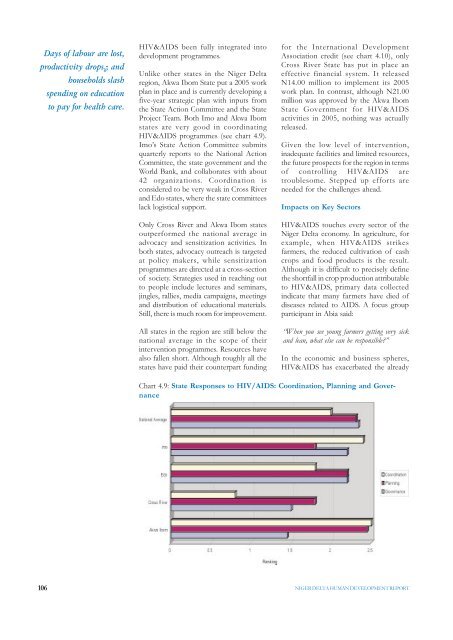Niger Delta Human Development Report - UNDP Nigeria - United ...
Niger Delta Human Development Report - UNDP Nigeria - United ...
Niger Delta Human Development Report - UNDP Nigeria - United ...
You also want an ePaper? Increase the reach of your titles
YUMPU automatically turns print PDFs into web optimized ePapers that Google loves.
Days of labour are lost,<br />
productivity drops,, and<br />
households slash<br />
spending on education<br />
to pay for health care.<br />
HIV&AIDS been fully integrated into<br />
development programmes.<br />
Unlike other states in the <strong>Niger</strong> <strong>Delta</strong><br />
region, Akwa Ibom State put a 2005 work<br />
plan in place and is currently developing a<br />
five-year strategic plan with inputs from<br />
the State Action Committee and the State<br />
Project Team. Both Imo and Akwa Ibom<br />
states are very good in coordinating<br />
HIV&AIDS programmes (see chart 4.9).<br />
Imo’s State Action Committee submits<br />
quarterly reports to the National Action<br />
Committee, the state government and the<br />
World Bank, and collaborates with about<br />
42 organizations. Coordination is<br />
considered to be very weak in Cross River<br />
and Edo states, where the state committees<br />
lack logistical support.<br />
Only Cross River and Akwa Ibom states<br />
outperformed the national average in<br />
advocacy and sensitization activities. In<br />
both states, advocacy outreach is targeted<br />
at policy makers, while sensitization<br />
programmes are directed at a cross-section<br />
of society. Strategies used in reaching out<br />
to people include lectures and seminars,<br />
jingles, rallies, media campaigns, meetings<br />
and distribution of educational materials.<br />
Still, there is much room for improvement.<br />
All states in the region are still below the<br />
national average in the scope of their<br />
intervention programmes. Resources have<br />
also fallen short. Although roughly all the<br />
states have paid their counterpart funding<br />
for the International <strong>Development</strong><br />
Association credit (see chart 4.10), only<br />
Cross River State has put in place an<br />
effective financial system. It released<br />
N14.00 million to implement its 2005<br />
work plan. In contrast, although N21.00<br />
million was approved by the Akwa Ibom<br />
State Government for HIV&AIDS<br />
activities in 2005, nothing was actually<br />
released.<br />
Given the low level of intervention,<br />
inadequate facilities and limited resources,<br />
the future prospects for the region in terms<br />
of controlling HIV&AIDS are<br />
troublesome. Stepped up efforts are<br />
needed for the challenges ahead.<br />
Impacts on Key Sectors<br />
HIV&AIDS touches every sector of the<br />
<strong>Niger</strong> <strong>Delta</strong> economy. In agriculture, for<br />
example, when HIV&AIDS strikes<br />
farmers, the reduced cultivation of cash<br />
crops and food products is the result.<br />
Although it is difficult to precisely define<br />
the shortfall in crop production attributable<br />
to HIV&AIDS, primary data collected<br />
indicate that many farmers have died of<br />
diseases related to AIDS. A focus group<br />
participant in Abia said:<br />
“When you see young farmers getting very sick<br />
and lean, what else can be responsible?”<br />
In the economic and business spheres,<br />
HIV&AIDS has exacerbated the already<br />
Chart 4.9: State Responses to HIV/AIDS: Coordination, Planning and Governance<br />
106 NIGER DELTA HUMAN DEVELOPMENT REPORT










